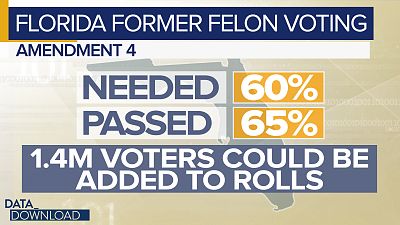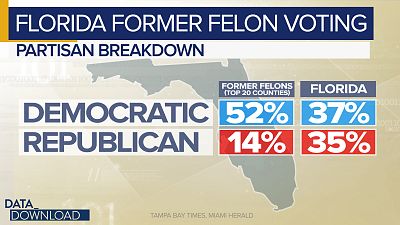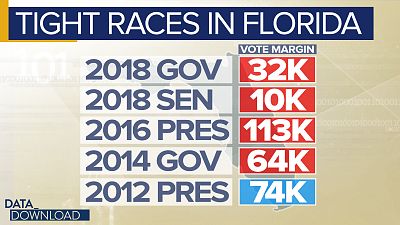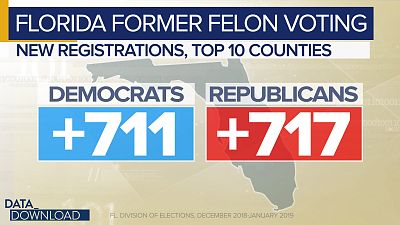By some estimates, changes to the Florida state constitution could add as many as 1.4 million new voters to the rolls in Florida.
WASHINGTON - This past fall, citizens in Florida votedto give most former felons the right to vote and in doing so they may have fundamentally altered the electoral math in the nation's swingiest perpetual swing state - or … maybe not.
In 2018, 65 percent of Florida's voters approved an amendment to the state's constitution that would automatically "restore the right to vote for people with prior felony convictions, except those convicted of murder or a felony sexual offense, upon completion of their sentences, including prison, parole, and probation."
The change brought Florida in line with most other states, where such restorations are commonplace, but it also dramatically changed the potential voter pool in the state. By some estimates, the change could add as many as 1.4 million new voters to the rolls in Florida.
And an analysis by two newspapers in the state showed those new voters could have a specific partisan lean. The Tampa Bay Times and Miami Herald looked at the most recent year of data on citizens who lost their right to vote in the 20 largest counties in the state and found a lot of Democrats.
In those counties, which hold more than 80 percent of the state's voters, 52 percent of those who lost their voting rights because of a conviction were Democrats. Only 14 percent of those who lost their voting rights because of felony convictions were Republicans. The rest had no partisan affiliation.
Those numbers stood in stark contrast to the overall registration numbers in the state, which are fairly evenly divided between the two parties - 37 percent Democratic, 35 percent Republican and 28 percent minor party or no affiliation.
Do the math on all those numbers and Democrats could see a net gain of several hundred thousand votes from the new amendment.
That has even more meaning when you look at recent presidential, gubernatorial and senatorial races in the state.
Since 2012, five of seven of those contests in Florida has boiled down to a winning margin of less than 1.5 percentage points and less than 120,000 votes - sometimes much less - and four of those five races has gone to the Republican candidate.
Those data suggest Amendment 4 could be a game-changer in the Sunshine State.
But the early returns don't show a dramatic shift in registrations, at least not yet.
Between December and January, Democrats saw a net gain of 711 new registrations in the 10 largest counties in Florida. Republicans actually saw a slightly larger gain in that time in those counties, an increase of 717 registrations.
In other words, the very early numbers show little impact and what impact there is shows no real gain for either party.
Taken together the figures suggest an important few points to keep in mind.
First, when looking at potential shifts in something driven by individual actions, something like voter registrations, "potential" is the operative word. These new potential voters have to be engaged enough to register.
That certainly may come with time - January 2019 is a long way from November 2020 - but there are no signs in the numbers as of now.
Second, even if these new voters register, there is no guarantee they will register with their old party or that they will vote party line if they do. In the era of Donald Trump, some old political stereotypes are dying and the two dominant political parties in the United States are changing. "Blue-collar Democrats" and "establishment Republicans" both seem to be somewhat endangered as species.
If anything Florida's rule change and the new registration numbers suggest both parties will be working hard in the state to activate a new group of voters and to turn them out to the polls.
After all, it's still Florida, the state that turned the 2000 presidential race into a weeks-long courtroom melodrama and put the phrase "hanging chad" into the American political lexicon. If every vote really matters, the state just got one million new reasons for it to be a dominant storyline in the 2020 campaign.















